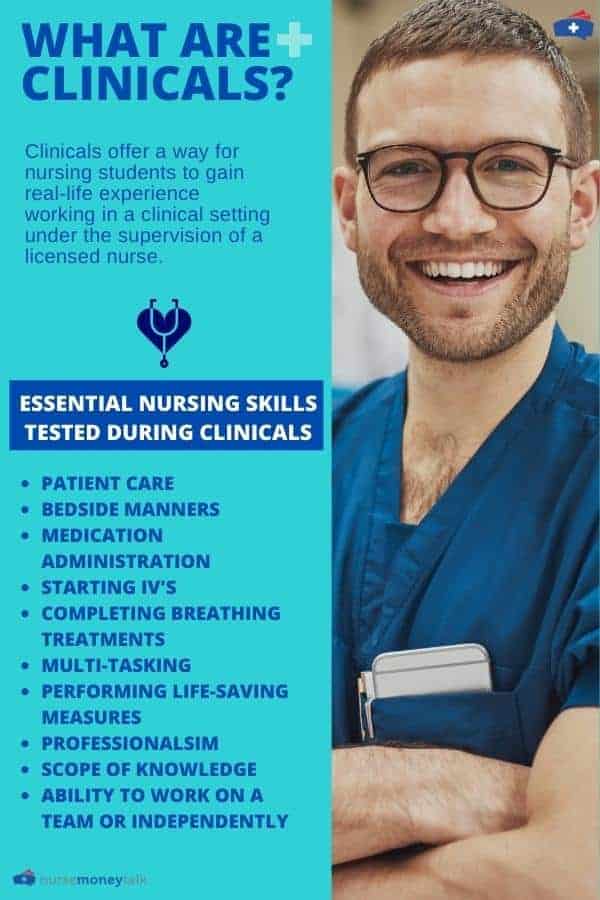As a nursing student, you will need to be involved in rigorous coursework, including nursing school clinicals.
Clinicals can be one of the most exciting times during nursing school and one of the most stressful.
*Disclosure: This article on I hate nursing school clinicals may contain affiliate links. If you click and make a purchase, I may receive a commission. For more info, please see my disclaimer.
I Hate Nursing School Clinicals: What to Do?
If you don’t like clinicals, remember they are a small taste of what working in a real-life hospital setting will be and is an important and mandatory part of nursing school. It’s best to analyze the specific factors of clinicals you don’t like and work to solve those factors separately.
Nursing Student Academy
Check out the comprehensive supplemental course nursing students are taking to improve their grades and pass nursing school.
What are Clinicals?

Clinicals are a portion of the nursing school held during the latter parts of nursing school. Clinicals offer a way for nursing students to gain real-life experience working in a clinical setting supervised by a licensed nurse.
Clinicals allow a nursing student to refine skills learned in lectures and lab.
On top of that, students get to practice skill sets that are hard to replicate in controlled lab settings such as:
- Patient care
- Bedside manners
- Medication administration
- Starting IV’s
- Completing breathing treatments
- Multi-tasking
- Performing life-saving measures
- Professionalism
- Scope of knowledge
- Ability to work on a team or independently
There are many benefits to participating in clinicals. For instance, clinicals are an excellent way to network and meet your future employer and future coworkers.
Although clinicals don’t count as work experience, they do provide an employer with the ability to see your work ethic first-hand, making it easier to get hired with them after nursing school is finished.
Clinicals also allow you to really see whether or not you like working as a nurse.
Is Nursing School Clinicals Mandatory?
Every state requires nursing school clinical. However, every state is different and requires a different number of hours to count toward your state RN license.
Usually, the number of clinical hours is between 120 to 140 hours per semester.
Although this seems like a high amount, it’s relatively small compared to the hundreds of thousands of hours you will work as a nurse.
The hours for nursing school are also spaced apart between different weeks.
Although clinicals are short in the grand scheme of things, it’s important to understand that this is a stressful time, and it’s normal to feel overwhelmed during clinicals.
Fortunately, there are things you can do to improve your experience as a student during clinicals.
Ask Yourself Why You Don’t Like Nursing School Clinicals?
In order to complete clinical and become a nurse, ask yourself what it is about clinical that you don’t like and solve those issues separately.
Finding a solution to your individual dislikes will make it easier to solve your issues and finish your clinicals.
Pro Tip:
I stress thinking about what parts of nursing school clinicals you don’t like and addressing those individually because clinicals are a necessary and mandatory part of nursing school.
There’s no way around it. If you want your nursing license and to be successful as a nurse, you have to go through clinicals and take it seriously.
What I’ve found is that there are usually parts of the clinical experience nursing students don’t like that end up ruining the whole thing for them.
Keep reading…I’m going to discuss those parts in more detail.
1. It’s Stressful

There’s no denying that nursing school is an incredibly stressful period of time.
If you hate clinical due to stress, it’s best to find some ways to practice self-care and stress-reduction techniques.
Learning to manage stress during clinicals can help you finish them with ease and prepare you to work in nursing later.
Some great stress-reduction techniques to incorporate into your day include:
- Journaling for 15 minutes a day
- Finding time to study and not cramming for tests/clinicals
- Exercising at least 30 minutes a day
- Practice deep breathing techniques
- Eating a healthy diet and not binge drinking during college
- Get enough sleep or at least take naps during the day if possible
- Meditate for at least 15 minutes a day
- Speak to a therapist if the stress or other life events are causing you significant distress
Related: How to Stay Healthy as a Nursing Student
2. It’s Time Consuming
During your clinicals, you will be expected to report and work in a hospital for several hours a day several days of the week. This is all while not being paid.
This can be frustrating, especially if you are a single parent or holding down another job.
If Speak with your employer to see if they can work around your clinicals. You might be able to have them accommodate your schedule, or at least reduce your hours while you complete your clinicals.
Remember that clinicals are only temporary, and they can pay off in the long run if you take the time to network in the facility where your clinical is at.
3. Problems with Nursing Staff

Like all jobs, you might run into nurses or other staff that you have trouble communicating with or treat you poorly as a nursing student.
Unfortunately, the slogan nurses eat their young is truer than I wish it were.
My advice is to try your best to deal with it (I know that’s not what you’re looking for). If things get really bad, Don’t be afraid to report any instances of hazing or harassment.
Even though you are a student, you should never feel as if you aren’t allowed respect in your place of work (or clinicals).
4. You Feel Like You Don’t Know Anything

This is a very normal feeling in nursing school hence why you’re in school. Just remember to study and prepare ahead of time.
Don’t be afraid to ask questions. Everyone understands this is your first time in a clinical setting.
Asking questions is how you’re going to learn, and people like it when other people ask them questions.
Pro-Tip
Seriously, asking questions is a good thing. It improves your likability (it can help with problem #3) and helps you learn.
It’s an interesting concept (I’ve linked an article here), but the general premise is that people would rather talk about themself.
Look at the Bigger Picture
Remember that your clinicals are meant to help you achieve your RN license and pass your NCLEX exam the first time.
Fortunately, some schools have a pass rate as high as 94% due to the learning opportunities clinicals give them.
Clinicals are not permanent, and they are a valuable tool for resourcing and learning more as a nurse.
If you’re ready to start clinicals and want to start looking for new jobs, look at our job board today!
Nursing Student Academy
Check out the comprehensive supplemental course nursing students are taking to improve their grades and pass nursing school.
Have You Read These Yet?
- Can a Nursing Student Study Abroad?
- Does Nursing School Have Summer Break?
- What to Expect in Nursing School Clinicals?
- How to Pass Nursing School Clinicals
- Do Nurses Get Paid For Clinicals?

